#Igbo Cultures
Text
THE ORAL HISTORY OF IGBO'S AND KOLA NUT
THE ORAL HISTORY OF IGBO’S AND KOLA NUT
Summary:
This nut is a significant part of the Igbo people’s lives and belief system in Nigeria. It has a long history dating back to ancient times and is considered sacred and utilized in various ceremonies, rituals, and social gatherings. The kola nut serves as a symbol of hospitality, friendship, and goodwill and is an integral part of the cultural…

View On WordPress
3 notes
·
View notes
Text
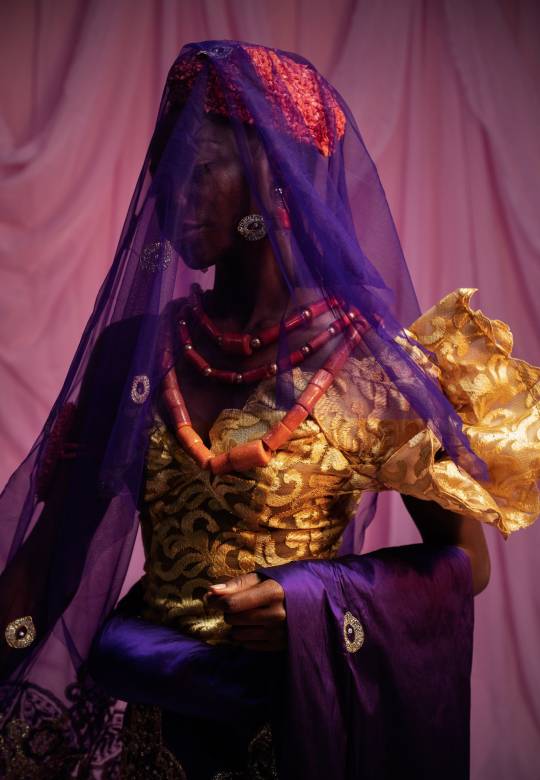
Igbo bride, Nigeria, by Lakin Ogunbanwo
#igbo#nigeria#africa#western africa#folk clothing#traditional clothing#traditional fashion#cultural clothing
1K notes
·
View notes
Text
The Igbo people (English: /ˈiːboʊ/ EE-boh,US also /ˈɪɡboʊ/ IG-boh; also spelled Ibo and historically also Iboe, Ebo, Eboe,Eboans,Heebo;natively Ṇ́dị́ Ìgbò) are an ethnic group in Nigeria. They are primarily found in Abia, Anambra, Ebonyi, Enugu, and Imo States. A sizable Igbo population is also found in Delta and Rivers States. Ethnic Igbo populations are found in Cameroon,Gabon, and Equatorial Guinea, as migrants as well as outside Africa. There has been much speculation about the origins of the Igbo people, which are largely unknown.Geographically, the Igbo homeland is divided into two unequal sections by the Niger River—an eastern (which is the larger of the two) and a western section.The Igbo people are one of the largest ethnic groups in Africa.

#african#afrakan#kemetic dreams#africans#brownskin#brown skin#afrakans#african culture#afrakan spirituality#Igbos#igbo culture#igboland#alaigbo#igbo#epic video
371 notes
·
View notes
Text
This month in Hoodoo History: The Igbo Freedom Landing March
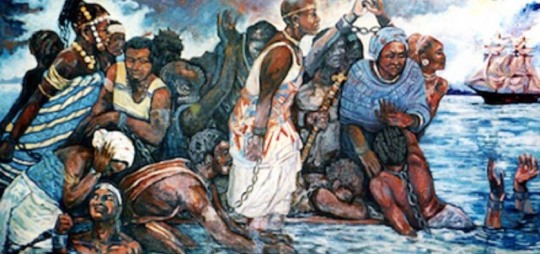
In May of 1803, 75 Igbo men & women chose freedom in death over a life of hell, spurring one of the largest mass suicides in the history of Maafa.
• In May 1803, a British slave ship called, The Wanderer, captured over a hundred Igbo men/women & other West Afrikan Peoples from present-day Nigeria and taken to Savannah, GA.
In Savannah, they were resold into Slavery to be worked to death on plantations along the Georgia coast. The price for each of their lives? $100. They were forcibly transported onto a ship called, the York that set sail for St. Simon's Island.
• During this voyage from Savannah to St. Simon's Island, 75 Igbo men & women rose up against their captors. They drowned the slavers, took control of the ship - grounding it in the Dunbar Creek.
At some point, the Igbo fled the ship. Led by their High Chief, a subset of the Igbo sang as they marched into a salt marsh of Dunbar Creek. One by one, they returned home in the face of a fate worse than death.

• This event that became known as, the Igbo Freedom Landing March, spawned enormous symbolism & folklore in the Afrikan Peoples and their descendants on this land. Many believe that the Freedom Landing and the nearby salt marshes in Dunbar Creek are haunted by the Spirits of the Igbo Peoples who drowned there. It is heralded as the first recorded Freedom March in U.S. history and has long since been a staple in Gullah-Geechee folklore, as the story of the Igbo Peoples who chose death over Slavery.
• Today, Igbo Landing is a nationally recognized historical site. It is located at Dunbar Creek on St. Simon's Island in Glynn County, GA.
• In September 2002, the Afrikan descendant community of St. Simon's Island, GA held a two-day commemoration of this event, including a procession to the salt marshes along Dunbar Creek where the mass suicide took place. They were represented by 75 Afrikan descendants across the country, Haiti, Brazil, & Nigeria. The attendees consecrated the site and did the collective work to elevate the restless Igbo spirits into healing and peaceful transition.

#hoodoo#hoodoos#atr#atrs#the hoodoo calendar#juju#igbo culture#igbo history#igbo#afrikan#igbo freedom landing March#black history#Hoodoo Folklore#west Afrika#Nigeria#Nigerian history#Georgia#Georgia history#Savannah#st simons island#african american folklore#Hoodoo History
139 notes
·
View notes
Text
can African Americans please stop saying "black culture" in reference to the homogenised African black cultures in the United States please
#its extremely reductive even in America#there are so many black people internationally in different nations with different cultures#im Nigerian i have no idea what cultures are in Uganda#im Yoruba i have no idea what cultures go on in Igbo#im black British so i understand other like Ghanian and Jamaican cultures#im black British and i have so much knowledge about African American culture because it is exported to me and then posed as “my culture” as#a black person. That cant be right#black brit#black people#black culture#aave#i have so many takes on aave ans how other people should be able to use it as a black brit who knows white boys eho say wagwan. it's not as#big of an issue as most people think tbh#African#african american#black history#black cultures#please dont homogenise blackness.
17 notes
·
View notes
Text
Understanding the Concept of Chi in Igbo Names
Written by Esther omoyeOkwu ID
A look at the Concept of Chi
The concept of Chi in Igbo culture is complex and has led to various interpretations and translations. It has been seen as the personal life force, guardian angel, creator, companion, individual providence, and portioned-out life principle. Additionally, it’s been interpreted as a person’s deity or identity in the spirit world,…

View On WordPress
7 notes
·
View notes
Video
youtube
Chiké & Mohbad - Egwu (Official Video)
#youtube#Chiké & Mohbad - Egwu#naija#ng#music dance#igbo#igbo culture#music#dance#dance challenge#afrobeats#Chiké & Mohbad#Egwu chike & Mohbad#Egwu
7 notes
·
View notes
Text
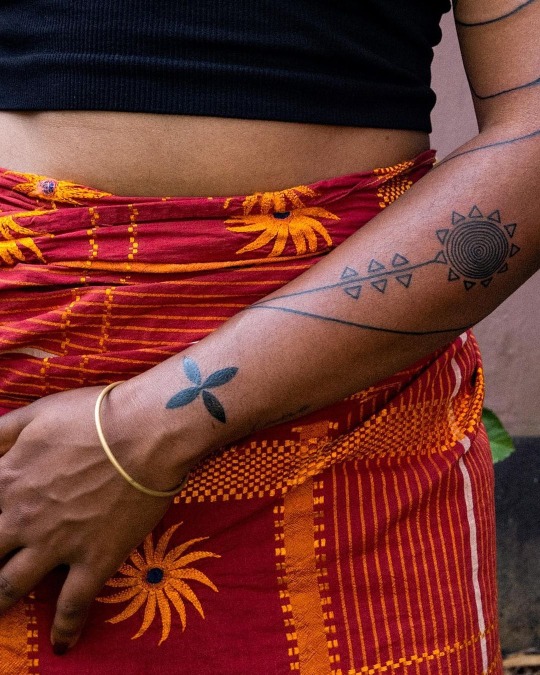
Uli tattoo by Emmanuel Item
73 notes
·
View notes
Text
Debunking The Myth: Why Yoruba Women are Equally Beautiful as Igbo Women
by Asake (throughmylens7)
Yoruba Women Are seen as Cheap
Yoruba women are known for their loyalty, humility, and their willingness to support their man even in tough times. They are often seen as the ideal "lover girl" in Nigeria. However, this view of Yoruba women comes with a negative connotation of being cheap, easy to get and lacking self-respect.
The Yoruba culture is one that strongly encourages self-sufficiency, intelligence, and independence in women. Yoruba women are taught to be hardworking and to earn their own income to support their families. They are also taught to be loving, caring, and understanding towards their partners. These qualities make them great partners to build a life with. However, these same qualities are also seen as masculine, which is not the norm for African women.
Yoruba women's willingness to support their men, even in tough times, is often taken for granted. Many men perceive this as being cheap and easy to get. This perception has made Yoruba women targets for nasty jokes and disrespectful behavior. They are seen as being too easy to get and not worthy of respect. This has led to many Yoruba women settling for less than they deserve in relationships .They are often "used as starter pack wives" because of their willingness to ''rough it in the mud" with broke men.
Yoruba Women are Primarily Dark skinned
Have you ever heard the saying, "You are too fine to be Yoruba"' or "You are too classy, cant believe you are Yoruba.'' Any woman that is well behaved and happens to be brown-skinned or fair is automatically labelled as Igbo?" It's a common phenomenon that has been around for decades, but no one seems to know where it originated from. This labeling can be frustrating and even offensive to some Yoruba women who are constantly mistaken for being from a different tribe simply because they beautiful and modest almost like it is crime to be Yoruba and pretty. The question is, why does this happen? Is it just a harmless misconception or something more insidious?
The topic of beauty standards in Nigeria has long been a point of contention, with various ethnic groups having their own unique standards that they adhere to. However, one thing that cannot be denied is the perpetuation of negative stereotypes and defamatory remarks directed towards Yoruba women. While there are many factors that contribute to this, one of the biggest advocators of this defamation are Yoruba men themselves. It is not uncommon to hear Yoruba men praise and associate undeniable beauty to women of other ethnic groups at the demise of their own women. This has led to a worrying trend of Yoruba women feeling inferior and excluded from the mainstream beauty standards.This has also made observers stigmatise yoruba women for the fact that their own men seem to lack appreciation for them.
Dark-skinned women in Nigeria face colorism and discrimination. The beauty standards in Nigeria often favor light-skinned women, leaving dark-skinned women feeling inferior and unappreciated. Dark-skinned women are often told that they are not beautiful enough and that they need to lighten their skin to be more attractive. This is one of the main reasons why Yoruba women are seen as undesirable. The media in Nigeria plays a role in perpetuating colorism and discrimination against dark-skinned women. The media often portrays light-skinned women as more attractive and desirable, leaving dark-skinned women feeling invisible and unappreciated. Dark-skinned women in Nigeria are beautiful, and they deserve to be celebrated. Yoruba women are strong, confident, and resilient women who have overcome the challenges of colorism and discrimination. They are role models for young girls who are struggling with their self-esteem and need positive representation in the media. Contrary to this, dark-skinned women from other ethnic groups are still appreciated and seen as beauty icons an example being the one and only Genevieve Nnaji a beautiful dark skinned Nollywood actress from the Igbo ethnic group. This is mainly due to the fact that , the Igbo ethnic group in Nigeria are known to uplift and positively promote the women of their ethnicity, regardless of the color of their skin or how they look.
Are Yoruba Men Enablers?
In today's world, where diversity in beauty is celebrated, it's shocking to see some Yoruba men struggling with accepting anything other than their own culture. For them, anything different or foreign is seen as exotic and more beautiful. It's a sad reality that has been forced upon women who identify as Yoruba, making them feel like they have to conform to a certain standard of beauty. It quite embarrassing to see statements like "Yoruba men are made for Igbo women" or ''Igbo women belong to us" with onlookers asking "Who are Yoruba women made for?" Statements like this are quite worrisome, it seems to me that men who utter such words simply do not see the women in their families as attractive. The notion that lighter skin is more attractive has been ingrained in the culture and the brains of some Yoruba men, making it incredibly difficult for some Yoruba women who are dark skinned to feel confident and beautiful in their own skin. This pervasive belief has led to a disturbing trend of skin bleaching, with some women going to dangerous lengths to achieve a lighter complexion.
In Nigeria, men have often viewed independence and self-sufficiency in women as a threat. However, women from other ethnicities, such as Igbo women are quite different to Yoruba women who are willing to tolerate disrespect and compromise for their broke partners. Igbo women prioritize their independence and are not afraid to demand respect from their partners. The men are required to to pay high dowries just to marry an Igbo woman, this makes most of these women highly sought after, and seen as expensive , a prize and a rare being to possess. This has also created the perception that Igbo women make better wives etc. But in reality Yoruba women are not bought but earned, the Yorubas simply do not believe in selling out their daughters in the form of dowry collection at the time of marriage. Nevertheless it's time we recognize the strength of all women, regardless of their ethnicity.
Yoruba Women Deserve Better
Yoruba women deserve better than the negative stereotype that characterizes them as being cheap and easy to get. They are hardworking, intelligent, and independent women who deserve respect and appreciation. Yoruba women are not perfect, but they are not cheap either. They are women who are ready to build a life with their partners, support their families, and contribute positively to their communities.
Yoruba men need to do better by appreciating and celebrating their women, and calling out stereotype propagators. They need to stop associating undeniable beauty with women from other ethnicities, but instead, acknowledge the beauty of their own women. Yoruba men need to stop taking their women for granted and start treating them with the respect they deserve. Yoruba women are strong, independent, and self-sufficient women who are worthy of respect and admiration.
In my opinion Yoruba women need to be more assertive and stand up for themselves. They need to demand respect from their partners and not settle for less than they deserve.
These women need to be confident in their own skin, regardless of their skin color. They need to be proud of their heritage and culture and not let anyone make them feel inferior. The Nigerian society also needs to stop perpetuating the negative stereotype of Yoruba women as being cheap and easy to get. The media needs to portray Yoruba women in a positive light, highlighting their achievements, and celebrating their contributions to society. Yoruba women need to be seen as role models and not as objects to be objectified and taken for granted.
In conclusion, Yoruba women are not cheap, dirty or ugly. They are women who continue to make waves all around the world regardless of the hate and false perception placed against them.
{BASED ON MY OUTLOOK}
23 notes
·
View notes
Text
Biafra: A History of Independence, War, and Ongoing Struggle
Biafra holds a significant place in the history of West Africa, particularly Nigeria. Its story is one defined by struggle, conflict, and resilience, with enduring implications that continue to shape the region to this day. The journey of Biafra as a partially recognized state, from its declaration of independence in 1967 to the end of the Nigerian Civil War in 1970, is steeped in deep-seated…
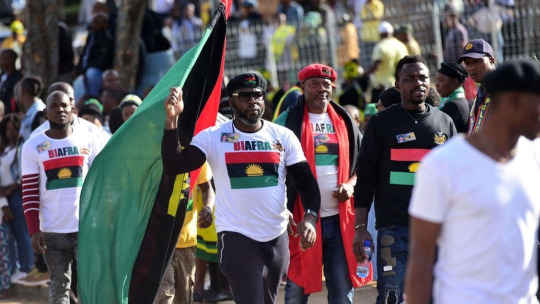
View On WordPress
#African History#Biafra#Biafra History#Biafra War#igbo culture#Igbo History#West African#West African history
2 notes
·
View notes
Text
Reposted from @akukoigbo Choi, Owere na-agbara m egwu ukwu biko!!
8 notes
·
View notes
Text

Igbo women, Nigeria, by freepik
#igbo#nigeria#africa#western africa#traditional clothing#traditional fashion#cultural clothing#folk clothing
264 notes
·
View notes
Text
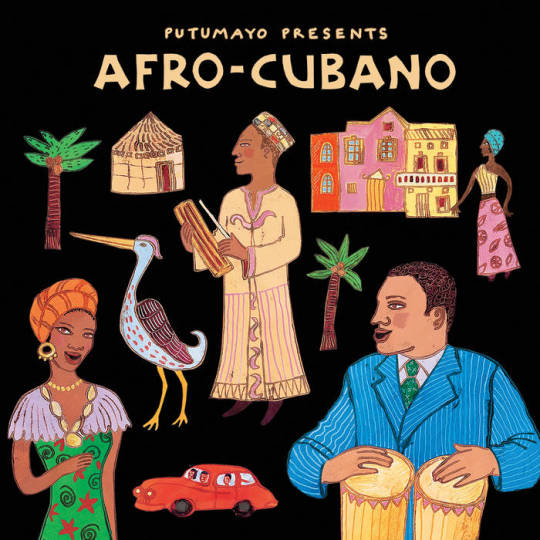
Music of African heritage in Cuba derives from the musical traditions of the many ethnic groups from different parts of West and Central Africa that were brought to Cuba as slaves between the 16th and 19th centuries. Members of some of these groups formed their own ethnic associations or cabildos, in which cultural traditions were conserved, including musical ones. Music of African heritage, along with considerable Iberian (Spanish) musical elements, forms the fulcrum of Cuban music.
Much of this music is associated with traditional African religion – Lucumi, Palo, and others – and preserves the languages formerly used in the African homelands. The music is passed on by oral tradition and is often performed in private gatherings difficult for outsiders to access. Lacking melodic instruments, the music instead features polyrhythmic percussion, voice (call-and-response), and dance. As with other musically renowned New World nations such as the United States, Brazil and Jamaica, Cuban music represents a profound African musical heritage.

Clearly, the origin of African groups in Cuba is due to the island's long history of slavery. Compared to the USA, slavery started in Cuba much earlier and continued for decades afterwards. Cuba was the last country in the Americas to abolish the importation of slaves, and the second last to free the slaves. In 1807 the British Parliament outlawed slavery, and from then on the British Navy acted to intercept Portuguese and Spanish slave ships. By 1860 the trade with Cuba was almost extinguished; the last slave ship to Cuba was in 1873. The abolition of slavery was announced by the Spanish Crown in 1880, and put into effect in 1886. Two years later, Brazil abolished slavery.
Although the exact number of slaves from each African culture will never be known, most came from one of these groups, which are listed in rough order of their cultural impact in Cuba:
The Congolese from the Congo Basin and SW Africa. Many ethnic groups were involved, all called Congos in Cuba. Their religion is called Palo. Probably the most numerous group, with a huge influence on Cuban music.
The Oyó or Yoruba from modern Nigeria, known in Cuba as Lucumí. Their religion is known as Regla de Ocha (roughly, 'the way of the spirits') and its syncretic version is known as Santería. Culturally of great significance.
The Kalabars from the Southeastern part of Nigeria and also in some part of Cameroon, whom were taken from the Bight of Biafra. These sub Igbo and Ijaw groups are known in Cuba as Carabali,and their religious organization as Abakuá. The street name for them in Cuba was Ñáñigos.
The Dahomey, from Benin. They were the Fon, known as Arará in Cuba. The Dahomeys were a powerful group who practised human sacrifice and slavery long before Europeans arrived, and allegedly even more so during the Atlantic slave trade.
Haiti immigrants to Cuba arrived at various times up to the present day. Leaving aside the French, who also came, the Africans from Haiti were a mixture of groups who usually spoke creolized French: and religion was known as vodú.
From part of modern Liberia and Côte d'Ivoire came the Gangá.
Senegambian people (Senegal, the Gambia), but including many brought from Sudan by the Arab slavers, were known by a catch-all word: Mandinga. The famous musical phrase Kikiribu Mandinga! refers to them.
Subsequent organization
The roots of most Afro-Cuban musical forms lie in the cabildos, self-organized social clubs for the African slaves, and separate cabildos for separate cultures. The cabildos were formed mainly from four groups: the Yoruba (the Lucumi in Cuba); the Congolese (Palo in Cuba); Dahomey (the Fon or Arará). Other cultures were undoubtedly present, more even than listed above, but in smaller numbers, and they did not leave such a distinctive presence.
Cabildos preserved African cultural traditions, even after the abolition of slavery in 1886. At the same time, African religions were transmitted from generation to generation throughout Cuba, Haiti, other islands and Brazil. These religions, which had a similar but not identical structure, were known as Lucumi or Regla de Ocha if they derived from the Yoruba, Palo from Central Africa, Vodú from Haiti, and so on. The term Santería was first introduced to account for the way African spirits were joined to Catholic saints, especially by people who were both baptized and initiated, and so were genuine members of both groups. Outsiders picked up the word and have tended to use it somewhat indiscriminately. It has become a kind of catch-all word, rather like salsa in music.
The ñáñigos in Cuba or Carabali in their secret Abakuá societies, were one of the most terrifying groups; even other blacks were afraid of them:
Girl, don't tell me about the ñáñigos! They were bad. The carabali was evil down to his guts. And the ñáñigos from back in the day when I was a chick, weren't like the ones today... they kept their secret, like in Africa.
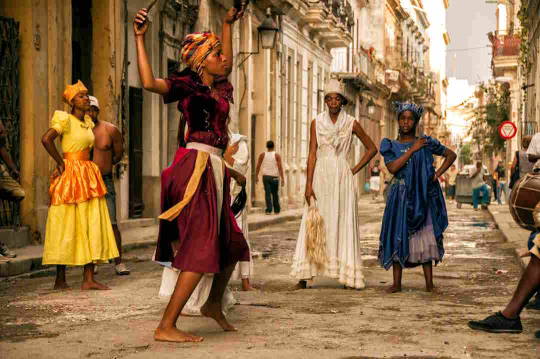
African sacred music in Cuba
All these African cultures had musical traditions, which survive erratically to the present day, not always in detail, but in the general style. The best preserved are the African polytheistic religions, where, in Cuba at least, the instruments, the language, the chants, the dances and their interpretations are quite well preserved. In few or no other American countries are the religious ceremonies conducted in the old language(s) of Africa, as they are at least in Lucumí ceremonies, though of course, back in Africa the language has moved on. What unifies all genuine forms of African music is the unity of polyrhythmic percussion, voice (call-and-response) and dance in well-defined social settings, and the absence of melodic instruments of an Arabic or European kind.
Not until after the Second World War do we find detailed printed descriptions or recordings of African sacred music in Cuba. Inside the cults, music, song, dance and ceremony were (and still are) learnt by heart by means of demonstration, including such ceremonial procedures conducted in an African language. The experiences were private to the initiated, until the work of the ethnologist Fernando Ortíz, who devoted a large part of his life to investigating the influence of African culture in Cuba. The first detailed transcription of percussion, song and chants are to be found in his great works.
There are now many recordings offering a selection of pieces in praise of, or prayers to, the orishas. Much of the ceremonial procedures are still hidden from the eyes of outsiders, though some descriptions in words exist.
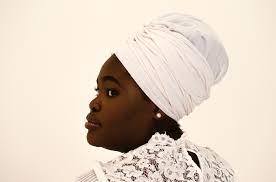
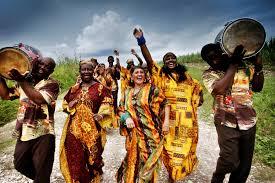
Yoruba and Congolese rituals
Main articles: Yoruba people, Lucumi religion, Kongo people, Palo (religion), and Batá
Religious traditions of African origin have survived in Cuba, and are the basis of ritual music, song and dance quite distinct from the secular music and dance. The religion of Yoruban origin is known as Lucumí or Regla de Ocha; the religion of Congolese origin is known as Palo, as in palos del monte.[11] There are also, in the Oriente region, forms of Haitian ritual together with its own instruments and music.
In Lucumi ceremonies, consecrated batá drums are played at ceremonies, and gourd ensembles called abwe. In the 1950s, a collection of Havana-area batá drummers called Santero helped bring Lucumí styles into mainstream Cuban music, while artists like Mezcla, with the lucumí singer Lázaro Ros, melded the style with other forms, including zouk.
The Congo cabildo uses yuka drums, as well as gallos (a form of song contest), makuta and mani dances. The latter is related to the Brazilian martial dance capoeira

#african#afrakan#kemetic dreams#africans#brownskin#brown skin#afrakans#african culture#fitness#afrakan spirituality#afro cuban music#afro cuban#igbo#yoruba#congo#african music
135 notes
·
View notes
Text
AFRICAN SPIRITUALITY IN NIGERIA

African spirituality and traditional African religions hold a rich and profound significance in the cultural fabric of the continent, particularly in regions like Nigeria. Rooted in indigenous beliefs and spiritual practices, these religions have played a pivotal role in shaping the lives and identities of African communities for centuries. As you may imagine, the religious landscape of Nigeria is incredibly diverse based on the many tribal groups that inhabit this land.
However, the traditional beliefs have stood the test of time as they are interwoven in virtually every aspect of African culture. These age-old religions remain deeply rooted in the belief that our ancestors continue to guide and protect us. Likewise, deities and natural forces shape our existence in deep and meaningful ways. As such, elaborate rituals and ceremonies are often performed to appease these forces.
Each ethnic group in Nigeria has its own unique customs, rituals, and belief systems. As such, it is vital that we recognize and appreciate them accordingly. Because they have all contributed immensely to the respective people groups in which they serve. Outlined below, you will find some of the more common traditions practiced in this region.
YORUBA RELIGION
The Yoruba religion is a deeply rooted spiritual tradition practiced for centuries. Originating from the Yoruba people of Nigeria, Benin, and Togo, this religion encompasses core beliefs, rituals, and deities that span the globe. This comprehensive faith system incorporates veneration of a Supreme Being, Orisas, and ancestor spirits.
ORISAS
Central to the Yoruba religion is the concept of Orisa, which refers to the various deities or spirits that are worshipped. These Orisas represent different aspects of life and nature, such as love, fertility, wisdom, and prosperity. Each Orisa has its own unique characteristics and attributes that devotees connect with through rituals and offerings.
EGUNGUN
Like many African traditional beliefs, one of the distinctive features of the Yoruba religion is its emphasis on ancestor (Egungun) veneration. Ancestors serve as intermediaries between humans and the astral realm. They maintain powerful influence over events and occurrences in the Earth. As such, they can be called upon for guidance and protection.
One way adherents honor their ancestors is during the annual Egungun festival. During this festival, masked dancers and performers embody the spirits of the deceased, allowing for communication with the ancestors. It is a colorful and lively event with elaborate costumes and drumming designed to evoke the presence of these spiritual forces.
IFA DIVINATION
Ifa divination involves seeking guidance and insight about various aspects of life. It involves the casting of divination tools (including palm nuts or cowrie shells). Thereafter, a priest or priestess interprets the patterns to guide individuals about personal and communal matters.
RITUALS AND CEREMONIES
Rituals also play a significant role in Yoruba religious practices. These rituals often involve music, dance, chanting, drumming, and elaborate costumes. They serve as a way to honor the deities and ancestors while fostering community cohesion.
EVOLUTION
In recent years, there has been a growing interest in the Yoruba religion outside of its traditional African homeland. This directly connects to its inclusive nature, rich cultural heritage, and spiritual depth of the tradition. The growing resurgence of people desiring to connect with their spiritual heritage has positively impacted the popularity and expansion of Ifa into the Western world.
IGBO RELIGION
The Igbo people, mainly located in southeastern Nigeria, follow Odinani, their traditional religious and spiritual belief system. Odinani revolves around the veneration of various spirits and deities, as well as ancestors. It is much akin to other traditional beliefs in Nigeria, though it maintains its cultural background rooted in the traditions of the Igbo tribe.
WORSHIP AND VENERATION
At the core of Igbo religion is the belief in a Supreme Being known as Chukwu or Chineke. Chukwu is believed to be the Creator of everything and holds ultimate power over all aspects of life. The Igbo also believe in many lesser deities or spirits known as Alusi, associated with various natural elements such as rivers, mountains, and forests.
Some of the prominent deities in this tradition include Ala (the earth goddess), Amadioha (the god of thunder and lightning), and Idemili (the goddess of water), among others. Rituals and ceremonies are performed to appease and seek blessings from these deities.
NEW YAM FESTIVAL (IWA JI)
The New Yam Festival is one of the most significant cultural events among the Igbo people. It marks the beginning of the yam harvesting season. It involves various rituals, including the offering of the first yams to the deities and ancestors to seek their blessings for a bountiful harvest.
NRI-IGBO RELIGIOUS SYSTEM
The Nri-Igbo religious system is a form of Igbo spirituality associated with the Nri Kingdom. It has its own set of religious practices, traditions, and beliefs and plays a vital role in the religious history of the Igbo people.
HAUSA-FULANI RELIGION
The Hausa and Fulani people, found in northern Nigeria, have their own traditional religious practices. Their belief system often involves the worship of spirits and ancestral veneration, similar to other traditional religions.
The use of protective charms and amulets is also common in the Hausa-Fulani traditional religion. These objects are believed to ward off evil spirits, provide protection, and bring good luck to the wearer. Charms may be worn as jewelry or carried on one’s person.
Though, it’s important to acknowledge that many Hausa-Fulani individuals and communities have adopted Islam as their primary religion. As such, they often incorporate a syncretic blend of traditional beliefs with Islamic practices. This syncretism varies from one community to another and can lead to a unique fusion of cultural and religious elements.
OTHER TRADITIONAL AFRICAN RELIGIONS IN NIGERIA
Beyond the traditions outlined above, other tribal groups maintain their indigenous belief systems. Below are additional spiritual systems commonly practiced in the region.
Edo Religion (Edo Traditional Religion): In the Edo State of Nigeria, the Edo people practice a traditional religion centered on the worship of ancestral spirits and deities known as “Ogboni.” One of the most prominent deities in the Edo religion is Edo, the god of divination and destiny.
Ibibio and Efik Religion: The Ibibio and Efik people in the Niger Delta region of Nigeria have their own traditional religious practices that involve ancestor worship and the veneration of various spirits and deities associated with water and the natural environment.
Tiv Religion: The Tiv people, primarily found in Benue State and some parts of Taraba State in Nigeria, practice a traditional religion that emphasizes the worship of ancestral spirits and various deities tied to the agricultural cycle.
Ijaw Religion: The Ijaw people, who inhabit the Niger Delta region, have a belief system that centers on the worship of water spirits, ancestors, and various nature-related deities.
Kanuri Religion: The Kanuri people, living in the northeastern part of Nigeria, practice a traditional religion that involves the veneration of spirits, ancestor worship, and the use of amulets for protection.
SUMMARY
Nigeria is a diverse country with a rich cultural heritage and a wide range of traditional African religions practiced by various ethnic groups. These traditional religions are often closely tied to the cultures and histories of the different ethnic communities in Nigeria. Despite the influence of Islam and Christianity in Nigeria, traditional African religions have managed to survive and adapt over time.
Many Nigerians practice a syncretic form of religion that combines elements of traditional beliefs with those of other faiths. Yet, the importance of traditional African religions can still be seen in various aspects of Nigerian society. They influence art forms such as sculptures, paintings, and textiles. They also shape social structures through concepts like kinship ties and community solidarity.
In conclusion, traditional African religions continue to hold a significant place in Nigerian culture. They provide a sense of identity, spirituality, and community for many Nigerians. Likewise, they contribute to the country’s diverse religious landscape.
#african spirituality#african traditional religions#traditional african religions#ifa religion#african spirit#ifa tradition#orisa#orishas#igbo culture#nigeria#africa#black tumblr
6 notes
·
View notes
Text
I have always wondered what it would be like to share my most powerful and intimate thoughts even as random as they are. I am glad to be on tumblr.

8 notes
·
View notes
Quote
'Africans are not black,' she said. 'They are Igbo and Yoruba, Ewe, Akan, Ndebele. They are not black. They are just themselves. They are humans on the land. That is how they see themselves, and that is who they are.'
What we take as gospel in American culture is alien to them, she said.
Caste: The Origins of Our Discontent by Isabel Wilkerson
#Caste#Isabel Wilkerson#African#black#Igbo#Yoruba#Ewe#Akan#Ndebele#themselves#human#land#identity#ethnicity#nationality#gospel#American#culture#alien#racism#erasure#discrimination#quotes
22 notes
·
View notes